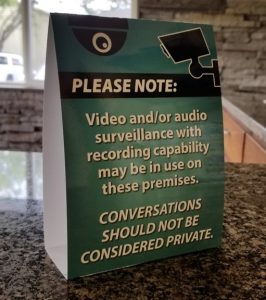 What responsibility do agents have to disclose and/or advise their clients about video and audio surveillance and recordings of listed properties?
What responsibility do agents have to disclose and/or advise their clients about video and audio surveillance and recordings of listed properties?
IREC added a note in the Agency Disclosure Brochure which reads: “Audio/Video Surveillance — Use caution when discussing anything while viewing a property; audio or video surveillance equipment could be in use on listed properties.” Be sure you highlight this when reviewing the brochure – maybe even having you and your clients initial next to that line indicating it was reviewed.
There is some debate about how Idaho law applies to surveillance/recording of listed properties as it’s being done in someone’s personal residence. One way to avoid any issues – for you or your clients – is to incorporate some safeguards into your business practices:
- Listings Agents Should Always Disclose — If your seller tells you they have audio and/or video surveillance or recording equipment of any kind (security cameras, baby monitors/nanny cams, video doorbell, etc.), you should disclose that information. We’ve seen some agents note that in the private MLS remarks, hang a notice on the front door, or place signage in the property. It may be worth creating a policy and form where you can document how your seller responded when you asked about this, including a way to show how you’ve disclosed this information if needed.
- Buyers Agents Should Always Forewarn — Whether or not disclosure is made by the listing agent or seller, or if surveillance equipment is obvious or not, it’s worth reminding buyers to not talk about likes, dislikes, pricing, etc., until away from the home. This may be difficult – especially when they find “the one,” but let them know that if a seller overhears, or sees an excited reaction, it could affect their ability to negotiate. Do this verbally and in writing and throughout the home buying process. (And don’t forget it’s on IREC’s Agency Disclosure Brochure.)
- Obtain Written Consent for Out-of-Town Buyer or Open House Videos — It’s worth it for buyer’s agents to obtain written consent from a seller directly or through their listing agent, before recording or live streaming a property for out-of-town buyers.
- Obtain Written Consent for Video Tours, Virtual Tours, and Open House Promos — It may even be a good practice for listing agents to obtain separate, written consent for video and virtual tours that will be shared publicly online as part of your marketing plan, as well as any open house promo videos shared to social media, done by you or another agent who may be holding the property open for you.
These tips are not meant to be comprehensive, legal advice, or even requirements, but they can be a great starting point to protect yourself and your clients when it comes to video and audio recordings or surveillance. Here are three other resources:
- Window to the Law: Video and Audio Surveillance Issues from NAR.realtor
- The Benefits and Risks of Home Video Surveillance When Selling a Property from the CRES Insurance Services blog
- Pick up Surveillance Tent Cards from the BRR REALTOR® Store for just $1 each for members!






